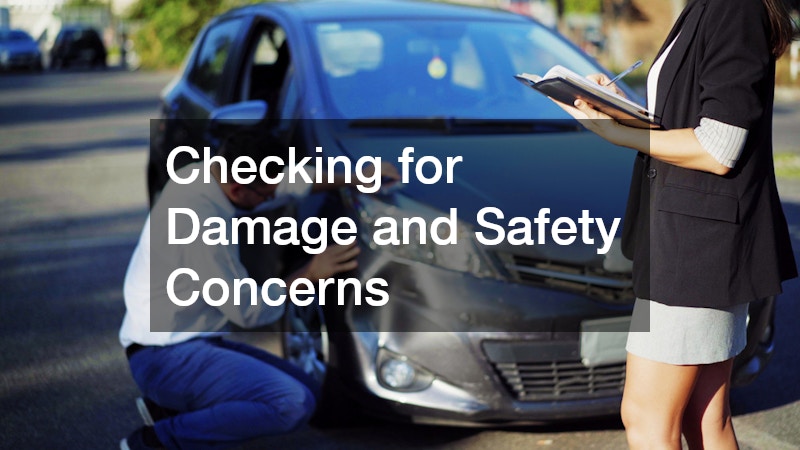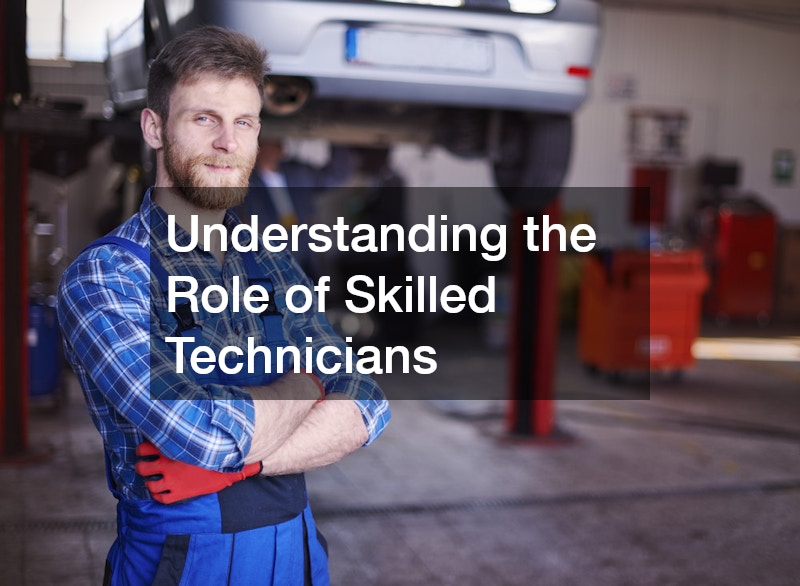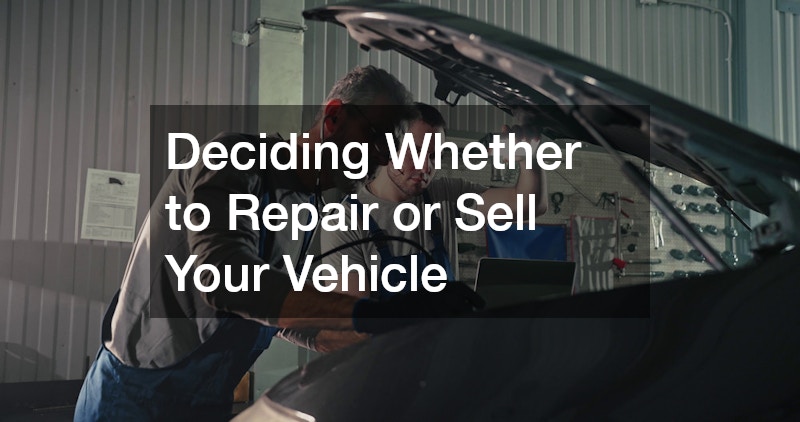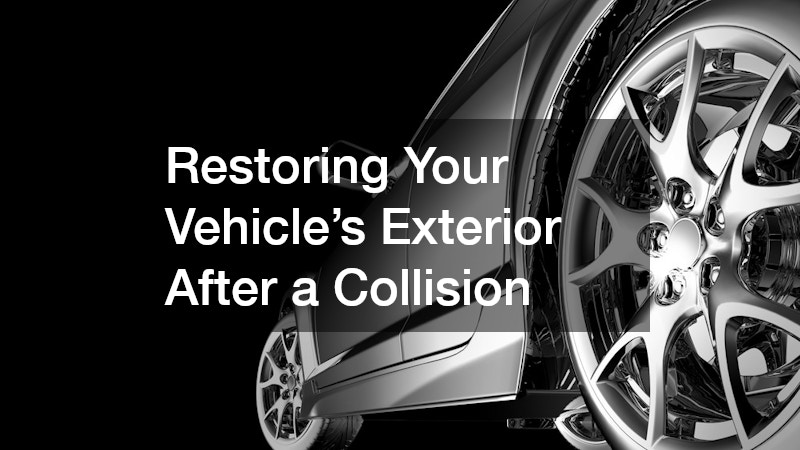Getting into a car accident can be an overwhelming experience, both emotionally and financially. Whether the collision is minor or severe, it’s important to know what steps to take once everyone is safe and the immediate situation is under control. How you handle your vehicle after the accident can affect your insurance claim, repair costs, and even your long-term safety. Many drivers are unsure where to begin—should you repair the car, assess the damage yourself, or contact professionals for help? Understanding the right sequence of actions can save time, reduce stress, and ensure that your vehicle is properly evaluated and restored. Taking a structured approach to post-accident recovery not only protects your investment but also helps you make informed decisions about what’s best for your car and your safety.
Checking for Damage and Safety Concerns
Immediately after an accident, your first priority should always be safety. Once you’ve checked for injuries and called emergency services if needed, turn your attention to assessing the condition of your vehicle. Look for visible damage, fluid leaks, and smoke, and listen for unusual noises that may indicate internal problems. Even if your car appears drivable, there could be hidden damage to vital components such as the suspension, frame, or brakes. Driving a compromised vehicle can worsen existing damage or lead to another accident. If possible, move the car to a safe location and document everything with photos before contacting professionals for a full assessment.
After this initial inspection, reach out to auto repair companies that specialize in post-collision evaluations. These professionals have the equipment and expertise to identify damage that may not be visible to the naked eye. They can perform diagnostic tests, estimate repair costs, and determine whether your vehicle is safe to drive or needs to be towed. Having a detailed professional assessment not only ensures your safety but also provides critical documentation for your insurance claim. Working with qualified experts gives you confidence that no damage will go overlooked, helping you make a smart decision about your car’s next steps.
Scheduling an Inspection With Professionals
Once the immediate situation is stable, the next step is to schedule a comprehensive inspection of your vehicle. A professional evaluation will help you determine the true extent of the damage, even if your car looks fine from the outside. Internal issues—such as engine misalignment, cracked components, or electrical failures—can easily go unnoticed without specialized equipment. Having your vehicle inspected quickly also prevents minor problems from turning into major repairs later on. Early intervention is key to keeping costs manageable and maintaining your car’s long-term performance.
To get a complete and accurate assessment, schedule an appointment with a trusted auto repair shop that handles collision-related services. These shops can perform detailed inspections, including undercarriage checks and computerized diagnostics, to pinpoint every issue. They’ll provide a repair estimate and outline which components need replacement or realignment. Working with a certified facility also helps preserve manufacturer warranties and ensures repairs are done to industry standards. By prioritizing a professional inspection right after an accident, you protect both your safety and your financial investment in your vehicle.
Understanding the Role of Skilled Technicians
When your car has been involved in an accident, having knowledgeable professionals evaluate and repair it is essential. Skilled technicians have the training to identify both visible and hidden damage, ensuring that no mechanical or structural issues are overlooked. Their expertise allows them to repair vehicles to manufacturer specifications, restoring safety features such as airbags, crumple zones, and braking systems. Without the right experience and tools, even small errors during repairs can compromise your car’s performance and safety on the road. Choosing a qualified technician gives you peace of mind knowing that your vehicle is being handled by someone who understands the complexity of modern automotive systems.
Certified mechanics play a critical role in getting your car back to its pre-accident condition. They use diagnostic technology to detect internal damage, recalibrate sensors, and test repaired components to ensure full functionality. Many mechanics also work closely with insurance companies to streamline repair approvals and documentation. Whether your vehicle needs engine work, alignment correction, or part replacement, a skilled technician ensures that every aspect meets safety standards. By entrusting your car to experienced professionals, you protect yourself from future breakdowns and ensure a thorough, lasting repair.
Finding Reliable Local Facilities for Repairs
After an accident, convenience and trust are key factors when deciding where to take your car for service. Local facilities often provide a more personalized experience, faster turnaround times, and greater accountability than large corporate chains. A nearby repair center allows you to easily check on progress, discuss concerns directly, and ensure that repairs are done correctly. Working with local experts also helps support your community’s economy while building relationships with professionals who can assist you in the future. Choosing a reputable, well-reviewed facility means you’re more likely to receive honest estimates and high-quality workmanship.
When researching garages in your area, look for certifications, customer reviews, and evidence of ongoing training for staff. A trusted local garage will have the right equipment for collision repairs, frame straightening, and paint restoration. Many also offer warranties on parts and labor, which adds another layer of protection for your investment. Ask about their experience with your car’s make and model, as specialized knowledge can make a significant difference in repair accuracy. By selecting a reliable nearby facility, you ensure that your vehicle is repaired efficiently and correctly while maintaining open communication throughout the process.
Deciding Whether to Repair or Sell Your Vehicle
One of the most difficult decisions after an accident is determining whether it’s worth repairing your vehicle or if selling it is the better option. Factors such as the age of the car, the extent of the damage, and the overall repair costs compared to its value all play a part in that decision. If the cost of repairs approaches or exceeds the car’s value, your insurance company may declare it a total loss. In such cases, you’ll need to decide if you want to keep the car and pay for repairs out of pocket or sell it for parts or scrap. Evaluating the long-term benefits versus immediate costs is essential to making a sound financial choice.
If your car is severely damaged, working with junk car services can provide a quick and convenient solution. These companies specialize in buying totaled or non-operational vehicles and often offer cash on the spot, even if your car no longer runs. They’ll handle the towing and paperwork, making the process easy and stress-free. Selling to a junk service also helps you recoup some of your loss while clearing space and avoiding ongoing storage or repair expenses. It’s an efficient way to move on from a damaged vehicle when repairs simply aren’t practical or cost-effective.
Inspecting and Maintaining Key Car Components
After an accident, even if your vehicle appears to be running fine, it’s important to inspect its essential components to ensure everything is functioning properly. Collisions can cause hidden damage to systems such as the exhaust, suspension, and catalytic converter, all of which are crucial for safe operation. Ignoring these issues can lead to reduced performance, poor fuel efficiency, or even emissions problems. Regular maintenance and detailed inspections help you catch issues early and avoid more expensive repairs later. Taking a proactive approach to vehicle care after a crash protects both your safety and your car’s long-term value.
Scheduling a catalytic converter service is one of the most important steps following an accident, especially if the underside of your vehicle was impacted. The catalytic converter helps reduce harmful emissions, and even slight damage can affect your car’s environmental performance and trigger warning lights. A professional technician can test, clean, or replace the converter if necessary to restore proper functionality. Ensuring that this part of your vehicle is in top condition helps keep it compliant with emissions regulations while maintaining smooth engine performance. Proper post-accident maintenance ensures your car remains both safe and efficient on the road.
Restoring Your Vehicle’s Exterior After a Collision
Even minor accidents can leave behind dents, dings, and scratches that affect the appearance and value of your vehicle. Addressing exterior damage not only improves aesthetics but also prevents rust and corrosion from developing over time. Many modern repair techniques can restore your vehicle’s body without the need for full repainting, making the process quicker and more affordable. Taking care of these cosmetic repairs early also ensures that your car looks professional and well-kept, which can be especially important if you plan to sell or trade it in the future.
One of the most effective options for handling minor body damage is paintless dent removal, a method that allows technicians to reshape metal panels without affecting the original paint. This process is ideal for small dents caused by fender benders or hail damage and is often more affordable than traditional repair methods. Skilled technicians use specialized tools to carefully massage the dented area back into place, preserving your car’s factory finish. This technique is not only cost-effective but also environmentally friendly since it doesn’t require paints or fillers. Choosing paintless repair ensures your vehicle looks as good as new while maintaining its original value.
Refinishing and Protecting Your Vehicle’s Surface
Once your car’s structural and mechanical repairs are complete, the final step is restoring its exterior finish. A fresh and durable coating not only enhances appearance but also protects your car from rust, moisture, and environmental wear. Refinishing can breathe new life into your vehicle, especially if the accident left behind scratches or damaged paint. Taking time to properly restore the finish ensures that your car maintains its visual appeal and resale value. For many drivers, a renewed exterior is a symbol of closure after the stress of a collision.
Working with a professional powder coating service can give your car’s surface a tough, long-lasting finish that goes beyond standard paint. Powder coating uses heat to bond pigment and resin to metal parts, providing superior durability and resistance to chipping or fading. This method is commonly used for wheels, frames, and metal components that experience wear from daily driving. Beyond protection, powder coating also offers a variety of colors and finishes to match your style or restore your vehicle’s original look. It’s an excellent choice for achieving a polished, high-quality finish that can withstand years of use while protecting your investment.
Contacting Your Provider for Coverage Guidance
Dealing with insurance after an accident can be one of the most stressful parts of the process, but it’s also one of the most important. Once everyone is safe and your vehicle has been assessed, contact your insurance provider as soon as possible to start your claim. Having all your documentation ready—including photos, repair estimates, and the police report—will make the process faster and smoother. Your insurer will help determine whether repairs are covered, if the vehicle is a total loss, and what steps are required to move forward. Staying organized and responsive ensures your claim is processed efficiently and accurately.
Your auto insurance provider can also connect you with approved repair shops and guide you through deductible payments and rental car options while your vehicle is being fixed. Some policies even include coverage for towing, roadside assistance, or temporary transportation during repairs. Understanding what your policy covers—and what it doesn’t—helps you avoid unexpected costs later. Communicating clearly with your insurer, providing honest information, and following their instructions ensures that you receive the maximum benefits available. Managing your claim properly helps protect your finances and speeds up your return to the road.
Seeking Legal Help for Accident-Related Claims
In some cases, the aftermath of a car accident involves more than vehicle damage—it can include injuries, disputed liability, or challenges with insurance settlements. When that happens, having legal support becomes essential. A qualified attorney can help you understand your rights, gather evidence, and negotiate with insurance companies on your behalf. They can also handle communication with other parties involved, ensuring you don’t say or sign anything that could jeopardize your claim. Legal representation gives you the confidence and protection you need during a stressful and often confusing time.
If you find yourself in a complex situation, consulting a car accident lawyer can make a significant difference in how your case is resolved. These professionals specialize in personal injury and accident law, helping clients recover compensation for medical expenses, lost wages, and property damage. They can evaluate whether a settlement offer is fair or if you should pursue further legal action. Many attorneys work on a contingency basis, meaning you only pay if they win your case. Having a lawyer on your side ensures that your interests are prioritized and that you receive the support and guidance necessary to move forward after an accident.
Dealing with the aftermath of a car accident can be overwhelming, but taking the right steps ensures that you protect yourself, your finances, and your vehicle. From assessing immediate damage and working with trusted professionals to understanding your insurance and legal options, each decision plays a crucial role in your recovery process. Acting quickly, staying organized, and relying on experts can prevent small issues from turning into major setbacks. Whether your car needs repairs, replacement, or legal follow-up, a structured approach will help you navigate each step with confidence.
Remember that your safety always comes first, followed by making smart financial and repair decisions. Contact professionals who can accurately assess damage, provide honest estimates, and guide you through repairs or replacements. Keep detailed records of all communication, estimates, and insurance correspondence to protect yourself legally and financially. Most importantly, take your time to ensure that your vehicle is fully restored or safely replaced before getting back on the road. With patience, attention, and the right support, you can turn a stressful accident into a manageable experience and get back to driving with peace of mind.



